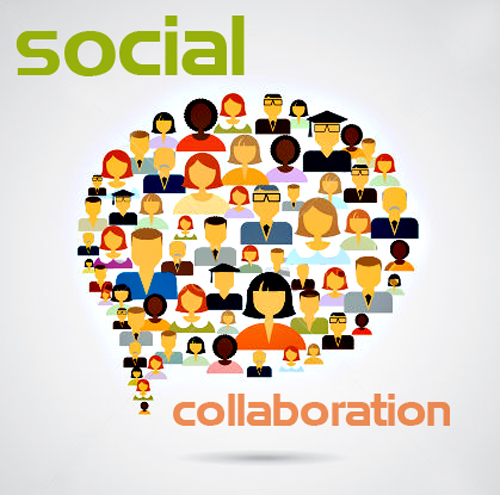Social collaboration (known also as enterprise social or enterprise social collaboration) has been silently transforming the way employees interact and work across organisations. For those organisations who’ve delivered on a considered social collaboration strategy, they’ve benefited from reshaping the way work gets done, by embedding social collaboration into the day- to-day work flow, they’ve fundamentally transformed conventional business processes, enabling a more productive and more enjoyable working environment. One that brings out the brilliance of their workforce. It’s no wonder there has been a surge in the uptake of social collaboration over the last five years.
What is social collaboration?
It is a fresh way of working, one that harnesses the power of human networks as a means to get employees working together better. It delivers the ideals of personal social networks (connecting and interacting with others, information sharing, and discovery) and extends this with group-centric features, empowering people to work together to achieve common goals.
Why has social collaboration finally happened?
Unsurprisingly there have been technological advances in the social collaboration platforms, but these haven’t been significant success factors. Surprisingly it’s the people that have permitted social collaboration to succeed. Employees, accustomed to using social networking in their personal lives, have become more accommodating in adopting social and collaborative approaches in their working lives. This relaxed employee attitude has finally permitted organisations to adopt innovative social collaboration approaches. Additionally, with the realization by senior management, that top-down directives don’t work for social implementations, better outcomes are achieved when these are compelled by their employees.
How is this relevant to programme and project managers?
In a nutshell, adopting social collaboration in a programme or project environment results in more effective collaboration between the team members (and stakeholders/partners if you extend it out to them), knowledge sharing (especially with virtual teams) and speedier communication channels, altogether leading to more successful project teams.
Imagine if you were given an environment that enabled your team members to get projects completed efficiently and promptly, assisting them to rapidly find the information they need, when they need it; straightforwardly sharing knowledge, experience and skills; communicating spontaneously, and seamlessly work together across geographies to achieve common business objectives of the project. Now extend this out to those difficult stakeholders you need to handle warily on a day to day basis; If they could participate in a collaborative manner would they be easier to deal with? Could you leverage this approachable engagement to overcome challenges and speed up project delivery?
What does this mean to the programme and project manager role?
It’s changing the way we work. Many in project management are still shying away from taking the plunge because social collaboration may seem overwhelming. But with the right strategies, tools and engagement, social collaboration can be a remarkable way to improve outcomes for your programmes and projects.
In a project environment, social collaboration has proven to improve communications, work management, knowledge management, cross-project interchange and innovation.
Project communication - Effective communication is a critical differentiator on whether a project is a success or not, in an environment where 50% or more of a project manager’s time is consumed by communication. Communication challenge only increases as the complexity increases in a programme environment. Social collaboration extends traditional communication channels (that are often direct and restricted, such as email) to encourage more inclusive engagement and collaboration, across organisational and geographical boundaries. It also enables virtual relationship building and discovery of people who can add contextual value to your project.
Personal work management – Enabling the project team to do the right thing, at the right time, with access to the right resources or rapidly discover people that can assist.
Skill and knowledge management – Encourages sharing, capturing knowledge, experience and skills, often on an open informal basis. It enables ramping up of skills, speeding up on-boarding of team members, and lessons learned for project initiation. Even providing local expertise to over-all knowledge capture. Locating individuals with expertise, social collaboration provides an ideal way for a project manager to find new and untapped talent within the organisation.
Cross-project interchange – Enabling an exchange of ideas, problem solving and insight across interrelated projects and programmes. Improves relationships with management and teams delivering these initiatives. This may also extend outside the organisational boundaries to partners.
Innovation – The ability to combine, capture and develop numerous perspectives has proven to facilitate problem solving, idea development, and innovation. Finding people with others with shared interests to help them solve large problems. Organisations have nurtured this insight through communities of practice, wikis, micro-blogs, etc. means that knowledge is retained and can evolve over time, benefitting future projects.
For many programme and project manager that have been tasked to deliver these social change projects, they have begrudgingly entered unfamiliar territory. One where collaboration is a key outcome of the project, as well as a prerequisite enabling it.
Experience has taught me that it is best to adopt an “eating one’s own dog food” approach to delivering these social collaboration endeavors. One where the project team utilities the social collaboration platform and adopts collaborative behaviors. Whilst this technique helps develop and test the social collaboration “product”, it also enables lessons to be learnt in a “safe” environment and empowers the team to explore more innovative outcomes.


No comments:
Post a Comment